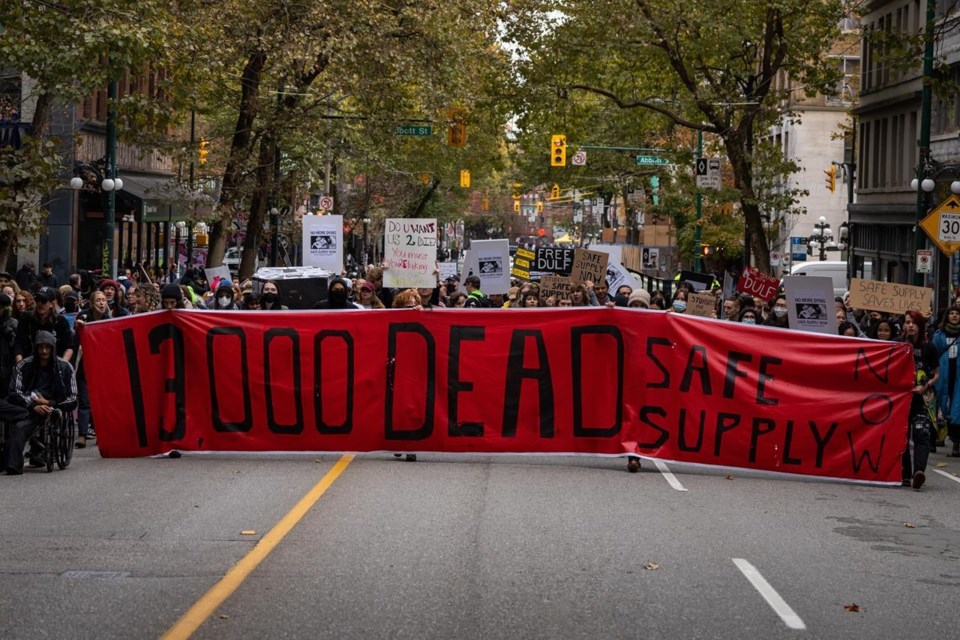VANCOUVER ÔÇö Activist and podcaster Garth Mullins has been advocating for safe supply of illegal drugs for years, but says he started feeling a "moral panic brewing" recently against the idea.┬á
Mullins was among hundreds of safe-supply supporters who gathered in Vancouver's Downtown Eastside Friday to protest against the recent arrests of the founders of the Drug User Liberation Front, which had been providing cocaine, heroin or methamphetamine it said had been tested for safety.
The group's website says it provided users up to 14 grams of the substances each per week, distributing a total of three kilograms of drugs "at cost."
Vancouver police raided the group's office and other addresses last week and arrested Eris Nyx and Jeremy Kalicum, saying the organization had publicly admitted trafficking illegal drugs. 
"The climate to harm reduction and safe supply has been getting increasingly hostile over the years," Mullins said, walking down Hastings Street with hundreds of people, behind a banner calling for action on the toxic drug crisis. 
Mullins said others who work on the front lines of the drug crisis have been "timid" in the face of a police crackdown and new laws against public drug use passed by Premier David Eby's NDP government.
He said that after the election of a new city council under Mayor Ken Sim, who promised to hire more police and had Hastings Street swept of tents months ago, "you could just see them (the police) strutting down the street with a confident swagger."
"I just thought it can't be long before they're coming for us," he said. 
On Oct. 26, police announced that multiple search warrants had been executed in an ongoing investigation into the Drug User Liberation Front.
Inspector Phil Heard, commanding officer of VPDÔÇÖs Organized Crime Section, said at the time in a statement that although DULF was trying to reduce harms caused by toxic drugs, "we have always warned that anyone who violates the Criminal Code or the Controlled Drugs and Substances Act could face enforcement and criminal charge."
"This group has knowingly operated illegally in the Downtown Eastside and we have now taken action to stop it," Heard said.
Those at the rally and march said the group's work saved lives by providing drug users with safe substances instead of having to risk purchases on a deadly illicit market.
Nearly 13,000 people have died of drug toxicity and overdoses in sa╣·╝╩┤½├¢ since a public health emergency was declared in 2016.
Leslie McBain, with the group Moms Stop the Harm, said DULF was doing work that should be done by government, but it had to resort to civil disobedience. 
"We know that the government should be doing this, but we're so far away from that and DULF had the courage, the compassion and really the love to go ahead and do it," McBain said in an interview. "For some reason, after two years, the Vancouver Police Department moved in and did what they did."
The raids came after weeks of pressure from the Opposition BC United for the government to investigate the activities of DULF, saying in a news release in September that it was "unacceptable that public money is being used to purchase illicit drugs" on the dark web. 
Vancouver Coastal Health's website says the Drug User Liberation Front Society received $200,000 of public money in 2021-2022, funding the government says has now ended.
Solicitor General Mike Farnworth said in the legislature last week that the contract was for "drug testing," not to buy drugs. 
McBain, who lost her only child to an overdose, says policymakers have been slow to take the kind of action needed to keep parents like her from losing more loved ones. 
"Civil disobedience is really the only way things change," she said. "We've lost kids. We're in it for the long haul here. We don't want other people to lose their kids."
Before the march, former city councillor Jean Swanson told the crowd that founders of DULF were motivated to act "because they've seen too many deaths." 
"I've seen Jeremy crying because of the death, and Eris is somewhere beyond crying," Swanson said. "It's those absolutely human and loving emotions that motivate their work."
Swanson said DULF had applied for an exemption from federal drug laws in 2021 to carry out their work, but it was denied by Health sa╣·╝╩┤½├¢.┬á
Scott Archondous, who volunteers in the neighbourhood, said drug users continue to be marginalized long after the declaration of the public health emergency.
"We're a vilified population down here," he said. 
He said he's known more than 100 people that have died in the last few years, including two he tried to resuscitate after finding them overdosing in an alley. 
"There's traumatic repercussions that come with that, and it just created an angry little bee in me," he said. "It's going to take legislation to actually treat drug users like human beings, to treat impoverished people like human beings." 
This report by The Canadian Press was first published Nov. 3, 2023. 
Darryl Greer, The Canadian Press



